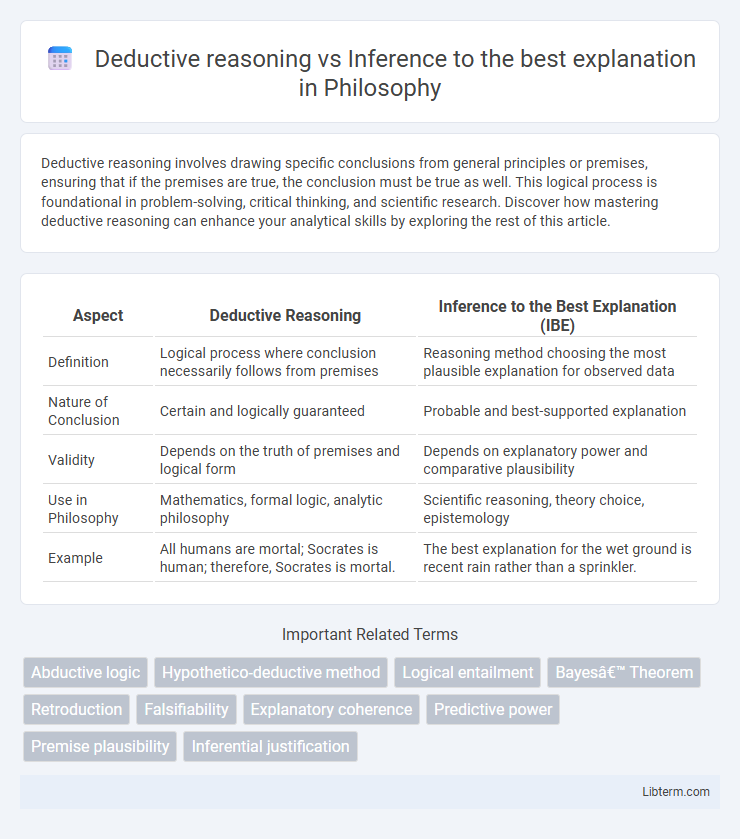Deductive reasoning involves drawing specific conclusions from general principles or premises, ensuring that if the premises are true, the conclusion must be true as well. This logical process is foundational in problem-solving, critical thinking, and scientific research. Discover how mastering deductive reasoning can enhance your analytical skills by exploring the rest of this article.
Table of Comparison
| Aspect | Deductive Reasoning | Inference to the Best Explanation (IBE) |
|---|---|---|
| Definition | Logical process where conclusion necessarily follows from premises | Reasoning method choosing the most plausible explanation for observed data |
| Nature of Conclusion | Certain and logically guaranteed | Probable and best-supported explanation |
| Validity | Depends on the truth of premises and logical form | Depends on explanatory power and comparative plausibility |
| Use in Philosophy | Mathematics, formal logic, analytic philosophy | Scientific reasoning, theory choice, epistemology |
| Example | All humans are mortal; Socrates is human; therefore, Socrates is mortal. | The best explanation for the wet ground is recent rain rather than a sprinkler. |
Introduction to Deductive Reasoning and Inference to the Best Explanation
Deductive reasoning involves deriving specific conclusions from general premises that are logically certain, ensuring conclusions are necessarily true if premises are valid. Inference to the best explanation, a form of abductive reasoning, identifies the most plausible hypothesis that best accounts for observed evidence, prioritizing explanatory power over certainty. Both approaches underpin critical thinking, but deductive reasoning demands strict logical necessity while inference to the best explanation embraces probabilistic plausibility.
Defining Deductive Reasoning
Deductive reasoning is a logical process where conclusions are derived necessarily from general premises, ensuring that if the premises are true, the conclusion must also be true. It guarantees absolute certainty by applying established rules of logic, often used in mathematics and formal proofs. In contrast, inference to the best explanation involves selecting the most plausible hypothesis to explain available evidence, relying on probabilistic judgments rather than certainty.
Understanding Inference to the Best Explanation
Inference to the best explanation (IBE) involves selecting the hypothesis that most plausibly accounts for observed evidence, emphasizing explanatory power and coherence. Unlike deductive reasoning, which guarantees conclusion truth if premises are true, IBE relies on evaluating competing explanations for their simplicity, scope, and predictive accuracy. This method is foundational in scientific inquiry where the best explanatory hypothesis guides theory development and empirical testing.
Core Principles Behind Each Approach
Deductive reasoning operates on the principle that conclusions necessarily follow from given premises, ensuring logical certainty when the premises are true. Inference to the best explanation relies on selecting the most plausible hypothesis that accounts for observed data, emphasizing explanatory power and coherence. Both approaches serve critical roles in reasoning but differ fundamentally in the nature of their justificatory frameworks and the degree of certainty they provide.
Differences in Logical Structure
Deductive reasoning involves deriving specific conclusions from general premises with absolute certainty if the premises are true, following a strict logical structure where validity guarantees truth. Inference to the best explanation (IBE) selects the most plausible hypothesis based on available evidence, relying on probabilistic support rather than deductive certainty. The key difference lies in deductive reasoning's necessity and IBE's emphasis on explanatory power and likelihood within an inductive framework.
Real-World Examples of Deductive Reasoning
Deductive reasoning is exemplified in real-world scenarios such as legal proceedings, where a general law ("All theft is illegal") combined with a specific fact ("Person A stole a bike") results in a logical conclusion ("Person A committed an illegal act"). Scientific experiments also employ deductive reasoning by applying universal principles to specific cases, like using Newton's laws to predict planetary motion. These instances contrast with inference to the best explanation, which relies more on evaluating competing hypotheses rather than strict logical derivation.
Illustrative Cases for Inference to the Best Explanation
Inference to the best explanation (IBE) involves selecting the most plausible hypothesis to account for observed evidence, often illustrated by detective cases where clues are pieced together to identify a suspect. For example, if a window is broken and valuables are missing, the best explanation for the scene is a burglary, rather than unrelated causes, demonstrating how IBE prioritizes hypotheses that best unify and explain the data. Unlike deductive reasoning, which guarantees conclusions if premises are true, IBE provides a probable, but fallible, conclusion based on explanatory power and coherence with the facts.
Strengths and Limitations of Deductive Reasoning
Deductive reasoning offers certainty when premises are true, enabling logically valid conclusions that guarantee truth preservation, which is crucial in mathematics and formal logic. Its main limitation lies in reliance on the accuracy and completeness of initial premises; flawed or incomplete premises lead to incorrect conclusions despite the method's logical rigor. Deductive reasoning struggles with empirical or ambiguous data where premises are uncertain, limiting its applicability in real-world problem-solving compared to inference to the best explanation.
Advantages and Drawbacks of Inference to the Best Explanation
Inference to the best explanation (IBE) excels in generating plausible hypotheses from incomplete data, making it highly useful in scientific and everyday reasoning where evidence is often indirect. Its advantage lies in flexibility and adaptability, allowing for the incorporation of new information to refine or revise explanations. However, IBE's drawbacks include potential subjectivity and the risk of favoring the most compelling explanation over the most accurate, which may lead to confirmation bias or false conclusions.
Choosing the Right Method: Contexts and Applications
Deductive reasoning guarantees conclusions based on logically certain premises, making it ideal for mathematical proofs, formal logic, and structured problem-solving scenarios where accuracy is critical. Inference to the best explanation excels in scientific inquiry, medical diagnosis, and everyday decision-making by selecting hypotheses that best account for available evidence, even if absolute certainty is unattainable. Choosing between these methods depends on context: use deduction for definitive conclusions and inference to the best explanation when working with incomplete or probabilistic data.
Deductive reasoning Infographic

 libterm.com
libterm.com